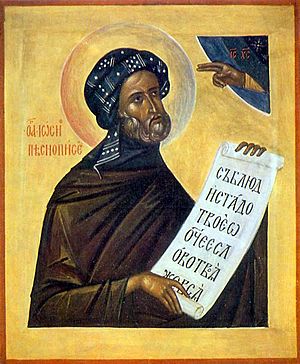Joseph the Hymnographer facts for kids
Quick facts for kids Joseph the Hymnographer |
|
|---|---|
 |
|
| Born | c. 816 Sicily |
| Died | 3 April 886 Thessalonica |
| Venerated in | Eastern Orthodox Church Roman Catholic Church Eastern Catholic Churches |
| Feast | Orthodox: April 3/4 Catholic: June 14 |
Saint Joseph the Hymnographer (Greek: Όσιος Ιωσήφ ο Υμνογράφος) was a Greek monk who lived in the 800s. He was one of the most important poets and writers of religious songs, called hymns, in the Eastern Orthodox Church. He was also known for bravely defending his Christian faith when others were trying to destroy religious images.
Sometimes, people confuse him with another person named Joseph, who was an archbishop. This other Joseph lived a generation before him. Because of this, it can be hard to know for sure which hymns were written by Saint Joseph the Hymnographer.
Contents
The Life of Saint Joseph
Joseph was born around 816 AD in Sicily. His parents, Plotinus and Agatha, were very religious. His family had to leave Sicily because the Arabs were invading the island. They moved to a place called Peloponnese.
When Joseph was about 15, he became a monk at the Latomos Monastery in Thessalonica. Around 840, the bishop of Thessalonica made him a hieromonk, which means he was both a priest and a monk. A famous monk named Gregory of Dekapolis visited Thessalonica. He was so impressed by Joseph that he invited him to join his monastery in Constantinople.
A Dangerous Mission to Rome
During this time, some rulers in the Byzantine Empire were trying to destroy religious images. This was called Byzantine Iconoclasm. Because of this, Joseph was sent on an important mission to Rome in 841. He was going to meet with Pope Leo III.
But on his way, pirates captured Joseph. They sold him as a slave on the island of Crete. While he was a slave, St. Nicholas appeared to Joseph in a vision. St. Nicholas told him to sing for God and then said, "Arise and follow me!" Soon after this vision, Joseph became free. He was finally able to return to Constantinople after more than a year in slavery.
Building Monasteries
After returning to Constantinople, Joseph founded a monastery around 855. He dedicated it to his teacher, Gregory of Dekapolis, who had passed away. Joseph started this monastery with his and Gregory's student, John. After John died, Joseph spent some years in a special place dedicated to St. John Chrysostom. Here, he continued his religious work and gathered many followers.
Joseph moved the holy relics (remains) of Gregory and John to his new monastery. He placed them in a church dedicated to St. Bartholomew the Apostle.
Exile and Recognition
In 858, Joseph was sent away to a place called Cherson. This happened because he spoke out against a powerful leader named Bardas. Bardas was the brother of Empress Theodora and was living in a way that was not allowed. Joseph returned to Constantinople in 867 after Bardas was killed.
Because of his good reputation, the Patriarch Ignatius I gave him an important job. Joseph became the skeuophylax (keeper of sacred vessels) at the Great Church in Constantinople. He was also highly respected by Patriarch Photius the Great, who was Ignatius's successor. Joseph even went into exile with Photius. He also helped inspire the first Christian missionaries to Russia.
People said Joseph had a special "gift of discernment" (the ability to understand things deeply). Because of this, Photius chose him to be a spiritual father and confessor for priests. Photius called him "A man of God, an angel in the flesh and father of fathers." Joseph died on April 3, 886 AD.
Writing Hymns
Joseph the Hymnographer wrote many beautiful religious songs. Since his work is sometimes confused with another Joseph, it is still debated exactly which poems he wrote.
However, many scholars believe he wrote hundreds of canons (a type of hymn) and kontakia (another type of hymn). He also wrote many hymns for different parts of the church year, like the menaion, parakletike, triodion, and pentekostarion. His hymns helped shape the way church services were sung.
Honoring Saint Joseph
Saint Joseph the Hymnographer is honored in both Eastern and Western Christian traditions. The earliest story of his life was written by Theophanes, who was the leader of Joseph's monastery after him.
His feast day is celebrated on April 3 in the Greek Orthodox Church and on April 4 in the Slavic Orthodox Church. The Roman Catholic Church celebrates his feast on June 14.
See also
 In Spanish: José Himnógrafo para niños
In Spanish: José Himnógrafo para niños
- Byzantine Music
- Gregory of Decapolis
- Heirmologion
- Octoechos and Parakletike
- Stoudios Monastery
- Sabas of Stoudios
- Sticherarion
- Theodore the Studite
Images for kids
 | Delilah Pierce |
 | Gordon Parks |
 | Augusta Savage |
 | Charles Ethan Porter |


